Inanna: myth of descent
Note: Most of us are familiar with hero myths. Today we see these “solar” myths from the patriarchal era as metaphors for the ego’s heroic efforts to conquer the “dragon” of unconsciousness and ascend into the heights of power, success, acclaim, fulfillment and enlightenment. Far fewer people are familiar with “lunar” descent myths, some of which predate the solar myths and feature women. Their themes are about loss, suffering, death and rebirth with resultant deepened self-knowledge, wisdom, compassion, trust and love.
Primitive humans probably created these myths to describe the cycles of life as it progressed through nature’s seasons, and to reassure themselves that spring’s sprouting and summer’s blossoming will always follow agriculture’s decline in the fall and apparent death in winter. But Dr. Carl Jung proved time and again that they are also stories about the life of the soul which can be of enormous comfort to individuals who find themselves in a descent phase of life.
In keeping with the onset of winter, this past December Susanne van Doorn featured a series of posts about the mythological theme of descent on her blog, Mindfunda. I was honored to be invited to write her first guest post about the Journey to the Underworld. The following is a repost of that article.
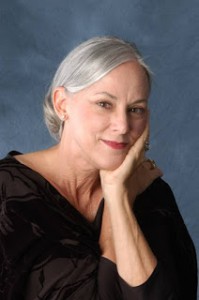
Today’s Guest author is Dr. Jean Raffa, a former television producer and college professor who—with the help of Jungian psychology—began following her passions for self-discovery and writing during mid-life. Jean has written several books. Her first was “The Bridge to Wholeness.” Her second book, “Dream Theatres of the Soul,” got her invited to make a keynote speech at the International Associations for the Study of Dreams in the summer of 2015. You can see her videos about this book at her YouTube channel. Her newest Wilbur Award-winning book is called “Healing the Sacred Divide.” Next week, Elaine Mansfield will write about the darkness of the descent.
On March 11-12, 2016, Jean will appear with author Elaine Mansfield at the C.G. Jung Society of Sarasota for a presentation on descent, loss and grief based on the myth of Inanna.
Myth of Inanna: 3 kinds of Descent
A psychological descent can take many forms. Sometimes it shows up in strategies to escape painful present realities by regressing into past memories. We’re consumed by a bittersweet yearning for the “good old days” when we were young and innocent. Life was easy and we were on top of the world.

Picture: viewsfromtheroof.com
We were a handsome Apollo, a confident football star and president of the high school student body who is trying to recapture our youth by driving a sporty new car or finding a younger wife. We were a beautiful, innocent Persephone, an entitled daughter and gifted student who has been pulled into the dark realms of obsessive binge eating, shopping sprees and plastic surgery.
A second kind of descent is forced on us by circumstances beyond our control: an accident, illness, divorce, loss of a home or job, death of a parent, child, or spouse. These can plunge us into the depths of a depression where grief and sorrow are constant companions.

Picture: huffingtsonpost
Then there’s the existential descent into meaninglessness which appears uninvited at mid-life. Suddenly the beliefs and ideals that served so well in the first half of life no longer work, yet questioning them feels dangerous. Worse, we’ve met our shadow in feelings and urges we can no longer ignore and our naively positive self-image is irretrievably damaged.
Captivated by the archetypal Hero’s widely publicized and deeply satisfying rise to success, we are rarely prepared for our conflicts and losses. To an ego that has prided itself on being in control and doing everything right, it can feel as if we are adrift in a chaotic sea. Kris Kristofferson described this painful experience in his song, “Shipwrecked in the 80’s.” For some, the metaphor of falling into an abyss and plunging into what St. John of the Cross called a “dark night of the soul” is more apt.
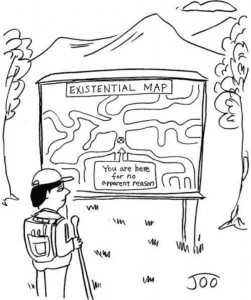
From the age of 17 I derived all the meaning I needed from my religion. Then at 37, I experienced an existential descent. On the outside it was business as usual, but inside I was walking through the valley of the shadow of death. Nine years later I was rescued by Jungian psychology. After committing to a regular practice of study, reading, self-reflection and dreamwork I finally began to understand what had happened. My ego had been brutally assaulted by unconscious instinctual forces within my psyche. Brutal? So it felt to me. Nonetheless my ordeal was life-serving. Without it, I would never have willingly explored my unconscious and been rewarded with the elixir of a revitalized life-force and the gold of affirming self-knowledge.
Inanna and the Descent Myth
Myths from every culture and religion are allegories of psychological and spiritual truths. In them, we can find guidance and healing meaning for our lives. Seeing the similarities between my story and the Sumerian descent myth of Inanna, Queen of Heaven and Earth, brought me great comfort.
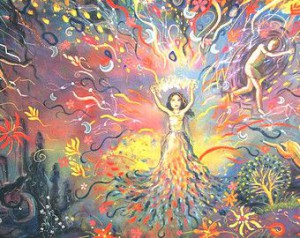
Inanna Queen of Heaven
unkown artist on easy.com
The first half of Inanna’s life was, like mine, fairly predictable. We both struggled to create a comfortable home, affirm our individuality, and establish our authority. Inanna accomplishes this by having a bed and a throne made for her. Then she cleverly tricks Enki, the God of Wisdom, into giving her the gifts of civilization, which she shares with the city she rules. She tops it all off (she assumes) by courting, seduction, bearing children, and fulfilling her Queenly duties.
I, too, gained knowledge through my cleverness: enough, at least, to get a college scholarship. I earned two degrees, met, courted and married my husband, established a home, and birthed a daughter and a son. Eventually I earned a doctoral degree and a college teaching position. I’ve done it all, I thought with a measure of self-satisfaction. That’s when I learned that cleverness, knowledge, possessions and physical comfort do not define success or insure fulfillment.
My descent from Inanna’s “Great Above” to the “Great Below” began when my shadow broke into my awareness with a moral conflict between two intolerable choices. I was profoundly tempted to break a rule that had always been sacrosanct to me, and appalled at myself for considering it. I spent sleepless nights praying to the God I had been taught to believe in, challenging beliefs that felt outdated and meaningless while fearing retribution for my audacity. I found little joy in living. My stomach hurt much of the time. I lost 20 pounds. At times I knew there was meaning in my ordeal, but my knowing provided scant relief. Mostly I felt alone and miserable. Like Inanna and Persephone, I was introduced to the dark underbelly of the unconscious beneath my naive “good girl” self-image. The shock was devastating.
Inanna is a “good girl” too: a loving wife to Dumuzi, a mother, and a sister to Ereshkigal, Queen of the Underworld. At mid-life Inanna descends into the underworld to, by some accounts, attend the funeral of Ereshkigal’s husband. Or was her call, “Let him come. Come, man, come!” an invitation to her animus, her unconscious masculine side?
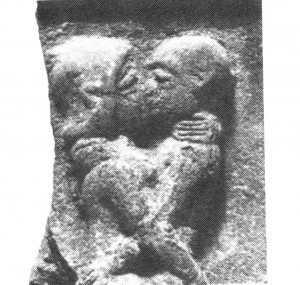
Inanna courting Dumuzi
Image: Beyondpottery.blogspot.com
On the way down she is humiliated by being stripped of all her earthly possessions: symbols of her beauty, success, femininity and the power she has worked so hard to attain. Humiliation is a crucial element of descent myths because crisis and suffering are the only powers that can destroy an ego’s belief in its invincibility.
The story of Inanna in body and soul
If we look for it, we will find that every detail of a myth can have psychological and spiritual meaning. For example, the number three in myths and fairy tales heralds the arrival of Mystery. Receiving three wishes, asking for help three times, or being the third and youngest child to attempt a difficult task signals our readiness for an initiation that will force us out of childhood innocence into mature responsibility and consciousness.

I Tjing hexagram 3: Difficulty at the Beginning
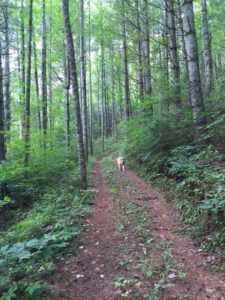


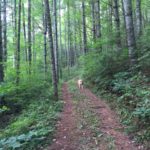


0 Responses
My favorite line: “…happily ever after does not tell the whole story.” Thanks for writing this piece, Jeanie. Thanks for loving the stories of Inanna as much as I do and for being such a wonderful story teller and dream/myth interpreter. I can hardly wait to share the insights of this myth in Florida with you. See you next month.
Thank you, Elaine. I love that line too. It’s just so true that “happily ever after is not the whole story,” and yet we cling to it like a lifeboat, and think something is terribly wrong with us when we don’t arrive at a safe harbor directly and immediately. I wish contemporary culture would catch up to the truths in Inanna’s 5,000 year old story. But I suppose that wish is just another way of clinging to a flimsy lifeboat. Facing reality is surely tough, but letting go of our fantasies is the way to happiness and peace.
Dear Jean, Thanks for this helpful post. I am currently reading Jean Shinoda Bolen about the Persephone myth, and believe it fully explains how I’ve been feeling for the past year and a half. I felt a cringe when you wrote that you had endured it intensely for 3 years, then more mildly for another 6. I wanted to ask you about something I am experiencing to see if you find it familiar. I often question my ability or capability to do simple things I’ve done for years, such as cooking or washing dishes. I find myself thinking, “Wow, can I do this correctly?” Not in a fully conscious way, but when I catch hold of my thoughts or am analyzing my anxiety. This process is brutal. I’ve wanted to write professionally for years; I finally earned an M.A. in Writing & Literature in 2013, and have had little desire to write since then. I am moving to New Mexico from South Carolina in April, just to get things moving again, and because I feel like a fish out of water in this state. I’m rambling. Let me end there. Thanks Jean. Peace, Eileen Sembrot
Hi Eileen, While the symbolic plot and meaning of our descents are universal, the individual details are not. It seems to me that my “dark night” lasted an unusually long time. Initiatory descents are tailor-made for each individual; thus there can be vast differences in cause, severity, and length.
I have awakened to all kinds of self-doubt over the years as my practice, insights and awareness have deepened. The self-doubt was always there at my core, I just didn’t know it until I started paying attention to thoughts and anxieties I had previously ignored. In my experience, this is a normal part of the journey. Peeling away the layers of our blindness and deafness takes time. Eventually, you begin to trust the process because you learn that the anxiety you feel over each new disturbing revelation will dissipate over time and be replaced with more compassion and self-acceptance. I used to beat myself up over each new aspect of my shadow that I discovered. Now I just shake my head, smile to myself, and say, “It’s okay, honey. Welcome to the human race.” Peace to you. Jeanie
Thank you for sharing.
Sent from my iPhone
>
Thank you for listening, Que. And caring. Jeanie
Dear Jeanie, I love your clear, lyrical writing! You describe well the three different kinds of descent and how each has transformed you during your ‘dark nights of the soul’ where the ego is brutally assaulted by those dark, unconscious forces that dwell in the Great Below. I found myself nodding and relating throughout. I agree, humiliation seems to be crucial in the soul’s evolving process, unavoidable even, as the ego is finally (and hopefully) destroyed forever and ever … no wonder they call it a ‘life’s work!’
What a journey, and what an incredible myth! You know it just blows my mind apart when I read that 5000 years ago, the story of how the soul evolves was already known to us. How could we forget! How long did I hang on my own hook I ask? Years I guess, rotting away there, humiliated, and stripped of everything I had once known. Oh my goddess! It makes me want to cry writing these words, for such are the extreme vulnerabilities and challenges we all face during these horrendous trials.
I relate deeply to mythology and folklore. Another story I love is Plato’s ‘Allegory of the Cave.’ For since ‘unhooking myself’ I feel I have been slowly emerging from Plato’s cave, struggling to receive the (sun) light and love in this world. Although the splendour of my new vision both shocks and delights me, I find that I return to the cave often to help others (both inner and outer lives) awaken. I throw my soul into the darkness and surrender to the mysteries of life. On one such descent a great woman once told me, ‘Savour every moment.’ There are no words.
Earlier this week I listened on YouTube to David Whyte reciting David Wagoner’s poem ‘Lost’ … it simply took my breath away. Thank you so much for introducing him in your last post. I’ll try and post my own personal myth poem on my blog this week, in the meantime, I’ll leave you with Wagoner’s remarkable poem. Blessings always, Deborah.
Lost
Stand still. The trees ahead and bushes beside you
Are not lost. Wherever you are is called Here,
And you must treat it as a powerful stranger,
Must ask permission to know it and be known.
The forest breathes. Listen. It answers,
I have made this place around you.
If you leave it, you may come back again, saying Here.
No two trees are the same to Raven.
No two branches are the same to Wren.
If what a tree or a bush does is lost on you,
You are surely lost. Stand still. The forest knows
Where you are. You must let it find you.
Dear Deborah,
I’ve seen that YouTube video too and was profoundly touched. What an amazing truth Wagoner has captured with this poem.
Feeling lost must be a uniquely human experience. Last week a lizard found its way into our house and kept showing up in the most unlikely of places: downstairs, upstairs, the kitchen, the bathroom, a hallway. A few days ago I heard a little musical strum on my husband’s guitar that rests in a stand in the family room. I knew it must be our lizard. I felt so sorry for it, being lost in a huge house with none of the usual sources of food and water. So once again I got a large plastic cup to cover it with so I could slip a piece of paper beneath it then carry it, covered, safely outside. But once again it eluded me. Stand still, I’d say to it. I just want to take you home, but it couldn’t trust me. I couldn’t blame it.
Then the other morning I found it in my closet and there was a plastic cup nearby (by this time I had several of them around the house) and I slid a piece of paper under it. The whole time I was carrying it downstairs and through the kitchen and out the back door I agonized at the distress it must be feeling, trapped in that plastic cup, experiencing a new kind of terror from an unknown force far greater than anything it could have imagined. And when, with great pleasure and relief, I released it in the grass it just stood there stunned, blinking, looking around, frozen to the earth. I was struck by the vastness of the world and the tininess of the lizard and it filled me with wonder to realize that here, in all this vastness, the lizard was not lost. This grass, this earth, this vast sky, this fresh air. It was home.
So now I wonder, did it really feel lost in my house, or was that just my human projection onto it? Was it really terrified in that cup, or was it simply doing what it always did, exploring its surroundings, trying to find its way to food and water, just living its one precious life? Could I ever be like that lizard? An instinctual creature with a healthy sense of self-preservation that knows how to protect itself, yet can be at home anywhere without feeling terrified and lost?
I bow to the divine in you, Deborah.
Namaste, Jeanie
Dear Jeanie, Thank you so much for sharing your wonderful lizard story! How confirming indeed that getting ‘lost’ is essentially a human practice. My early childhood days in the garden were filled with lizards and newts. I recall my delight at racing around capturing them, collecting great numbers before letting them all go … only to start collecting them in my giant jam jar, all over again the very next day! Oh I had forgotten that happy memory and the uniqueness of each little creature. In my book of symbols I just read that lizards encourage us to pay (even more!) attention to our dreams than usual. Namaste, Deborah.
Oh my: lizards encourage us to pay (even more!) attention to our dreams than usual. I love that. I’ve been trying, but last night was the first night I recalled a “real” juicy dream that wasn’t just a mass of work-related thoughts! Apparently my lizard had more than one message for me. Thank you, Deborah. I look forward to reading your personal myth poem. Jeanie
Hi Jeanie,
Once again you have posted something powerfully said with so many real and emotional aspects to the material I am both inspired and flummoxed. The theme both raises many questions, and the consequences of descent floats emotions to the surface.
The idea of a 3 day ‘meat hook’ experience is like a crucifixion isn’t it. A self-sacrifice of sorts. Some part of one’s being ‘hung out to dry.’
In terms of timing, it does seem this descent can come along long after making a terrible mistake. A mistake i.e. ‘hubris’ that functioned quite marvellously for some time. Maybe such mistakes are a way of postponing the descent? Is the descent always waiting? Always prepared?
Who or what exactly do you think is manoeuvring all of these objective, external realities to match up with the required psychological, emotional, spiritual transformations. The ubiquitous ‘Universe?’ An actual mythological figure in our being? Synchronicity as an ‘agency’ of….universal psyche? In the same way sub-atomic particles know they are being observed our ‘need for descent’ somehow arranges events?
You mention acceptance of forces far more powerful than your (and our) ‘puny will.’ Perhaps that is enough knowledge to suffice about ‘How this all transpires?’
You mention instinctual energies, pain, compassion…awakening. I appreciate so very much your way of stating practical, beneficial results arising from intersecting with ancient mythological tales/songs, beings and themes. It’s a way you have of making depths accessible and very much appreciated from here.
I have gone through this experience recently, without knowing about Inanna, and joked to friends that the ‘pit’ had a rubber bottom, so I was able to bounce back up. Your post has put things in a much sharper focus. I had thought of karma ‘burning off bad energy’ and maybe there is something to that in terms of the ‘meat hook’ experience but your posting has said more. Your phrase alchemical opus very much speaks of a major work, both personal and grand, and universal, being played out.
Thank you again so very much.
Hi Steven,
Yes, there are many levels of meaning in this piece to ponder. And you have a marvelous, thoughtful, spot-on way of pinpointing them.
Is a 3-day meat hook experience like a crucifixion? Yes. This is an archetypal theme that runs through history. This does not negate the Christian descent story which appeared 3,000 years after Inanna’s story. Rather it confirms it. We humans are made such that in order to acquire greater consciousness and spiritual awareness we first have to ‘submit’ or ‘sacrifice’ our egos to the far greater forces of Nature’s evolutionary energy that are pushing everything that lives toward consciousness and enlightenment …….and most of all, toward love. The ego experiences this ‘death’ as a tragedy, as if God is a blood-thirsty punisher who’s trying to take the BAD out of us, but really it’s just a threshold to growth into a deeper, wiser, more loving and aware way of living.
I think a descent just automatically comes after our egos have grown aware enough to see that what we’ve been doing isn’t working, and strong enough to tolerate the discomfort of change. Again, it’s just the way we’re made. We all suffer, and we all have the ability to learn from our suffering. It’s just that different souls spend more or less time in the various phases of psycho-spiritual growth. Perhaps that’s what’s meant by karma: there’s an inherent, underlying pattern to human growth and we each experience it differently. The descent is always there waiting for us, but many of us will spend our entire lives ignoring and avoiding the inevitability of it, and keep making mistake after mistake, only to find at the end that there’s no escaping the birth/death/rebirth cycle of life.
What exactly “is manoeuvring all of these objective, external realities to match up with the required psychological, emotional, spiritual transformations?” I don’t know. I can only guess. I certainly don’t see it as a judgmental bearded Santa Claus/King on a heavenly throne playing chess with humanity as I did as a child. I think of it as a cooperative interaction between all the entities that make up a conscious, benevolent ‘universe’—or matrix or whatever we want to call it—that are working together to bring more light into the darkness of unconsciousness.
Some of these entities would be our psychological inheritance (both archetypal and human…DNA, instinct, physical bodies and health, etc.), our experiences, (especially the formative ones from childhood), our personalities, our choices, our teachers, etc. I think the biggest factor—the one that initiates transformation—is our ego’s sincere desire to learn to love, a desire so strong that we willingly surrender to these forces instead of fighting them. Once we do that, “Nature takes its course” so to speak, because now we have a “religious” attitude of trusting what IS instead of wanting to have our own way with life.
The phases of our life—and our openness to accepting and staying conscious while we undergo them so that we can grow and change and become transformed into more conscious beings—is indeed an alchemical opus: our Big Work.
Thank you for your kind words and thought-provoking questions, Steven. I enjoy the challenge of trying to answer them as clearly and authentically as I can. I suspect there are many others here who enjoy these exchanges too.
Blessings, Jeanie
P.S. For you and anyone else who’s interested, Patti Moed published an article about me today for her Pilot Fish Trailblazer Nominee blog. You can find it here: http://pilotfishblog.com/2016/02/12/pilot-fish-trailblazer-nominee-dr-jean-raffa/
Thank you for this in depth reply Jeanie. After this very long day I will wait to reread it and give it the thoughtful & alert engagement it deserves. With appreciation, Steven
Thank you for this reply Jeanie,
The first part of your comment pauses me before the consideration of ‘before and after.’
This is a very interesting phrase: ‘…forces of Nature’s evolutionary energy that are pushing everything that lives toward consciousness and enlightenment…’
This makes one see themselves as pulsing with sparks and light…and how being dead to this is like being, well, dead.
Then you say ‘….and most of all, toward love.’
And who wants to be dead to love?
This reminds me so much of Dylan Thomas’s poem (and line) The force that through the green fuse drives the flower.
Also it reminds me of developing a consciousness that cracks apart the
system of unenlightened thought/action ruling the planet. Or as Mr. Dylan once said, ‘To live outside the law you must be honest.’
I suppose such an honesty with ourselves precipitates accepting such descent rather than (as you say) ignoring and avoiding the inevitability of it, and keep making mistake after mistake…
(Better late than never… I say to myself).
Thank you for the description of all the elements at play: personal self & history, Universe, Intangibles…connected to ‘our ego’s sincere desire…’ and Nature taking its course equaling an Alchemical Opus and our Big Work.
This is like a guide-book to the process [Book of the ________ ] and if I may play with words here: This is what you are becoming then. All of these things at play as we are delivered or something is delivered to us. I’ve never thought of a seed as anything but benign but I suppose if it refuses to grow it’s sort of a ‘non-seed.’ A flower seed surely must have a sincere desire to become flower. The seed story is a type of descent isn’t it.
The image of a schism rending the earth is impressing itself upon my mind as a metaphor around descent. I suppose schisms are a two way street.
And you emphasize Love as motivation towards growth. With cooperation in play between entities of light and our personal development.
I remember how the Beatles albums were seen as metaphysical clues…to being…and in their song ‘The End’ the line “And in the end, the love you take is equal to the love you make.
Your thoughts have sparked all sorts of connections.
This is great. All great and inspiring. Thanks for taking the time to respond with these thoughts.
Steve